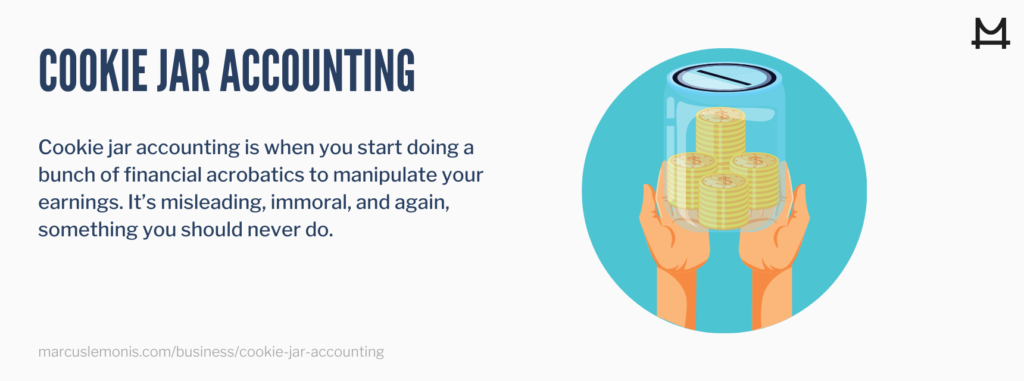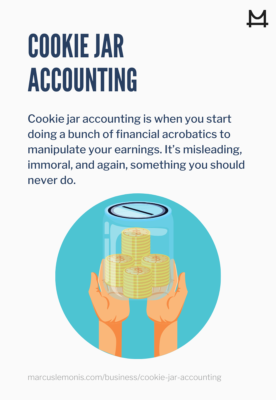Do you remember when your dad went out for the day and gave you a list of chores? He might’ve called on his way home to ask if you remembered to take out the recycling. You probably froze up for a second because your chores definitely slipped your mind. But instead of playing it straight, you might’ve blurted out, “Yes, Dad. I absolutely remembered to take out the recycling!” Then you quickly hung up the phone, raced into the garage, and dragged the bins down to the curb to cover your tracks. You were nine, still learning about the world, and fudged the truth a little bit to make yourself look better. Those teaching moments are perfectly normal, reveal important lessons, and are part of growing up.

But there’s a similar moral dilemma that may follow us into our adult lives. It’s called “cookie jar accounting.” That’s when a company fudges their accounting to make themselves look better. You’ll learn about a few different ways that companies do this, but it’s important to know it’s often illegal. Of course, you’d never break the law yourself. Especially on purpose. But financials are complex and full of gray areas. So, it’s important to know exactly what cookie jar accounting is. That way, you can steer clear, set a tone of morality at your company, and hold your team accountable for doing things the right way. Success is great, but it’s like Marcus always says, “Don’t compromise who you are.”
This article helps to show you where the line is so you don’t accidentally cross it. (Of course, as with any financial information, we advise you to consult your attorney or tax advisor to find out what is best for your individual situation.)
What Is Cookie Jar Accounting?
Cookie jar accounting is when you start doing a bunch of financial acrobatics to manipulate your earnings. It’s misleading, immoral, and again, something you’d never do. But just so you can spot it, let’s take a closer look. The practice usually involves doing one of two things. First, you might see a company set aside earnings without documenting those earnings right away. The reason they don’t document those earnings at first is so they have the flexibility to document them later when it’s more advantageous. For example, if business is really slow one year, they don’t want to give the appearance of being in decline. So, they just tap that hidden pile of money, put it on their books when they need it the most, and make it look like their earnings are right on track.

Next, you might see a company fudge their liabilities. They’ll either set aside way too much money for something on purpose. Or they’ll set aside money to pay for something that’s not even real, like a rebranding they never actually plan to go through with. That way, they’ve overestimated their liabilities by a lot and can “fix” this overestimation whenever they want. So, let’s say they’re having another sluggish year. Sure, their earnings were low, but they can claim their expenses were even lower. So, in a roundabout way, it looks like they still came out on top… all through a bit of wonky, illegal accounting.
In either case, there’s a common denominator. You’re creating a secret stash of money that you can release whenever you need to prop up earnings. It’s usually to conceal down years, and create a false sense that the company is trending up. But like Marcus always says, “People respect you more if they get the truth as opposed to a bunch of fluff.” So, make sure you’re playing it straight with your books. You’ll feel better and it’s simply the right thing to do.


How Does Cookie Jar Accounting Work?
Let’s take a look at WorldCom, a telecommunications giant that found itself at the center of a famous scandal back in 2001. The L.A. Times explains that WorldCom was setting aside money for taxes, litigation, acquisitions… basically all of the stuff that you’d expect a company to set aside money for. But here’s the problem. They were inflating those estimations. By a lot. Instead of setting aside a reasonable amount of money, they were grossly overestimating, and they were doing it on purpose. The goal was to create a slush fund of supposedly “extra” money.

That way, when it came time to release their numbers, WorldCom’s expenses were always magically lower, which made their profits magically higher. But at the end of the day, that’s all it was. Magic. It wasn’t real. They were creating a false impression that business was booming and they were always over-performing. It’s a form of lying, and further, it can be illegal. It all caught up with WorldCom in the end, as they were caught hiding $3.9 billion in expenses from 2001 to 2002. The Securities and Exchange Commission’s former chief accountant, Walter Schuetze, explained cookie jar accounting like this, “Companies can just reach into these reserves any time they want and make any earnings number they need to.”
But as you’ve learned, cookie jar accounting isn’t just about exaggerating expenses. It’s also about secretly socking away earnings for a rainy day. That’s exactly what happened with Microsoft between 1995 and 1999. The BBC explains that around this time, a lot of the tech industry was navigating some pretty choppy waters. But Microsoft’s earnings always seemed to be right on track, which apparently aroused suspicion. A closer look revealed that Microsoft had been making money, but not always putting it on the books. By doing so, they were creating a secret “rainy day fund” that they could tap into whenever things got slow.

So, if they were having a down year, Microsoft could just reach into the cookie jar, put some of their secret money on the books, and all of a sudden, it doesn’t look like they were having a slow year anymore. In fact, they look like they’re right on track, just as profitable as they’d always been. Again, this is illegal and Microsoft had to answer for it when the S.E.C. started poking around. So, when you’re building your team, especially the people who do your financials, take a little advice from Marcus and “Surround yourself with good people.” Make sure they share your values and know the importance of truth in accounting.
Why Cookie Jar Accounting Is Wrong
Investors like to get a sense for future earnings. Obviously, they can’t predict the future, but they always try to get a sense for it. One way they do this is by looking for trends. How did a company do five years ago? How about four years ago? Three? Two? Is there a trend emerging? Are those numbers trending up? Is there a very clear pattern of growth?

That growth is obviously a good thing and something that would be exciting to any investor. But cookie jar accounting means investors can’t rely on those positive trends. Because those trends are an illusion created by misleading accounting. Investors end up putting money into a company based on bad information. Essentially, they’re getting ripped off.
Some people might find cookie jar accounting especially tempting, because at first glance, they don’t consider it to be stealing. In their way of thinking, Microsoft actually made their money fair and square.
So, who cares when it goes on the books? It’s not like they stole the money. But the reason it’s wrong is that it’s deceptive. Companies do it because they’re trying to create an overly rosy picture. They’re trying to create the misleading impression of steady growth. Investors are hoping to buy one thing, but are getting another. It’s the same concept as selling someone a mansion, but giving them a normal-sized house. They simply aren’t getting what they signed up for, and never would’ve gone ahead with it unless someone pulled the wool over their eyes.

Accounting the Right Way
You obviously want to declare your earnings when you’re supposed to. You also want to estimate liabilities with accuracy. But your responsibility is even bigger than that. It’s about creating a culture of legitimacy. A lot of really great, honorable people have some moments of weakness when they’re under extreme pressure. So, let your team know the difference between good and bad pressure. They might feel a little pressure to work hard and get results. But they shouldn’t feel any pressure to manufacture those results.
Make sure your team is clear on that. You might also talk to your team about the nature of investors. Behind each and every investment, there’s a person. People rely on these investments. They’re not just spreadsheets. They’re people’s retirements, pensions, and college funds. These investments have a very real impact on very real people. Make sure your accounting practices honor that.
Cookie jar accounting is illegal and important to understand so you can get out in front of it. One of the best ways to get out in front of it is by having a very clear, direct conversation with your accounting team. Don’t assume anything. Make sure everyone is on the same page as to how to conduct business in a forthright way. Marcus always says, “Your job as the CEO of the business is to be the coach.” So, make sure you coach your team to do the right thing. You’ll feel way better about it when your company is not only growing, but doing it the right way.
This article is informational only and subject to errors or omissions. As with any legal or regulatory advice, please consult your legal counsel or tax advisor to make sure you are in compliance with all and any federal, state, city or county rules and regulations. More
- Have you heard of Cookie Jar Accounting?
- What procedures do you have in place to ensure you are following proper accounting methods?





